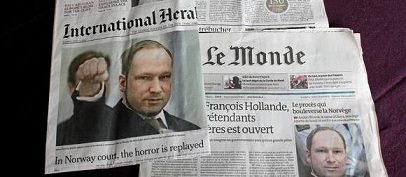Zionism Is Dead And Kicking

Israel's Prime Minister Benjamin Netanyahu stands in front of
a portrait of Theodore Herzl, the father of Zionism. (Reuters)
In a recent Haaretz article, leading Israeli columnist Gideon Levy affirms that Zionism is pretty irrelevant as far as Israelis are concerned. Similar to the line I myself develop in The Wandering Who?, Levy contends that Israelis do not understand what Zionism stands for. For them it is an archaic notion.
The meaning of it is simple. That which seems as a vivid ‘Zionist’ / ‘anti Zionist’ debate is in practice an internal Jewish Diaspora quarrel with no significant practical meaning.
Levy writes, “In 2012, the 64th year of the (Jewish) state, no one even knows for certain what remains of it (Zionism), what the role of Zionism is and how it is defined.”
“Who is a Zionist?” asks Levy. “The truth is that there is no answer. Not because Zionism was not a just cause – it was, even if it was tainted by unnecessary injustices, and not because it didn’t succeed. It was the greatest national success story of the 20th century. But that century is over and its greatest success story has been established. The national home arose, and now it is a regional power. Anyone who wanted to – about one-third of the Jewish people have – join it, and the door remains open to the rest.”
Zionism was clearly a Judeo-centric revolutionary idea, but as it seems, it achieved its goal in 1948. Hence, it isn’t surprising that contemporary Israelis fail to grasp the meaning of Zionism. If early Zionists promised to transform the Diaspora Jew into an civilised being, the Israelis, for some reason, see themselves as ‘civilised subjects’. They at least in their eyes, are the post revolutionary products.
Hence, Levy argues that “Zionism is no longer relevant, and its place is in the history books alone.” He suggests that “Zionism’s way has been lost to us (the Israelis). That was inevitable, because it has completed its task.”



























